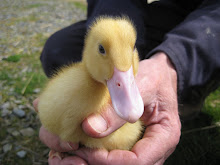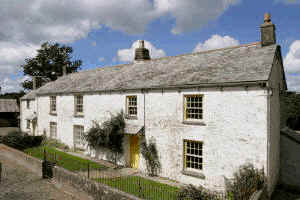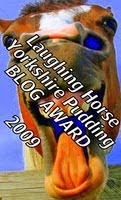 So much to say about last night's Channel 4 documentary film on farming, Molly Dineen's The Lie of the Land, but had to skedaddle for the day. I'll be back to try and get my head round this later.
So much to say about last night's Channel 4 documentary film on farming, Molly Dineen's The Lie of the Land, but had to skedaddle for the day. I'll be back to try and get my head round this later.Later: I'm always interested, in fact fascinated, to get a deeper insight into a world that I am a part of. It's that old thing of wondering if the portrayal will give you something new to chew on, no matter how well you thought you had it sussed; gaining the benefit of the objective viewpoint. Dineen's unpeeling of farming life showed some things that will have shocked many - the killing of calves that have no market value being a particular focus. But the messages were repetitious and incredibly partial. Watching the programme, you would think that all farming activity is in some way related to hunting, whether it be the lack of a future for the huntsman, or the need to produce pheasants for the shooting season. You might also be forgiven for thinking that no farmer made any money, that they were incompetent at handling their livestock (ruining their precious lawns in the process), that filling out forms was beyond them all and that the life was nothing but strife.
Even with the calves being a such a feature of the film - what with them being dispatched shortly after birth if they were male and from dairy cows - we never got inside the problem other than being told they had no value. It seems to me that there are two reasons why they have no value. Firstly because the eating of veal is castigated by the vast majority of people in Britain as a cruel activity. If veal was seen as a viable food by folks, then there would be no need to kill calves quite so young, and crucially for the farmers the meat would have a real monetary value instead of being a liability. Secondly, there has become such a division between what is a milk cow and what is a meat cow that never the twain shall meet. What's wrong with producing a dual purpose cow that has value in both markets? This used to be the case - and still is with various rare breed animals of all sorts - including chickens that are as good for eggs as for the table.
The South West, where much of the film was shot, was very heavily hit by foot and mouth. It was a terrible time and caused great hardship. However, many of the farmers in the region continue to farm with a positive outlook, rearing (and handling) their livestock with skill and producing excellent quality meat, milk, cheese, wool and other products. They lived through the awful time and moved on, adapting and using intelligence and knowledge to keep their businesses and lives and families on an even keel. And yes, rural poverty continues, and is painful as the film vividly portrayed.
Farmers famously hate bureaucracy and form filling. They live outside and don't on the whole warm to desk and computer work. Yes, forms can be a pain in the neck, but unless you are the kind of person who hands a year's worth of jumbled receipts to your accountant and says "sort that lot out for me", filling in applications for the single farm payment is not a difficult exercise. It certainly doesn't require a consultant from another county to sort it out for you, or to bring their politics to the table. What is difficult, and almost soul destroying, is getting the Rural Payments Agency to get your details right in the first place. What is even more difficult is restraining yourself from throwing your computer out of the window if you try and complete farming stuff on-line that is on such a go slow it crashes everything in sight. Having the knowledge to fill in the forms is the easy bit.
We never saw a farmer producing food for the "don't want it cheap, want it good and preferably local" market, the organic and specialist producers that the Matthew Forts, Nigel Slaters and Hugh Fearnley Wotsits extol in print and on tv. The market for food that is not just cheap (nor imported) is growing steadily and some farmers' markets have become visitor attractions as well as genuine alternatives to the supermarket. Farmers also sell their products from farm shops and direct to the customer on-line. It's a changing world with modern approaches. It may not be an easy life and there are a host of farm related scandals that must be made more visible, such as the many supermarket practices taking a dreadful toll on the farmer committed to supplying the big five; I would certainly want to see supermarkets forced to play fair by farmers. The failure of delivering promised subsidies on time has also caused nightmares for farmers as has the red tape that makes small local abattoirs such rarities. But the general tone of the film that farmers were in a complete slough of despond and hadn't the mental wherewithal to counteract their situation, and that sound environmental practices equalled nationalisation of the countryside, meant that the viewer was given a very narrow and therefore poor insight. With so many people increasingly conscious about the source and quality of their food, it's time for a thorough investigation and developing understanding of farming today, and I really hope that a lengthier series will be commissioned to reveal the full picture for everyone who has any interest in where the stuff on their plate originates.

















4 comments:
Thank you for that succinct analysis. I'm still not sure what Dineen's agenda was. If she was hoping to inform the public at large about the agricultural industry as a whole then she failed miserably - but she did manage to reinforce the chattering classes' stereotypical views about a small section of country life.
There did seem to be much emphasis on slaughter of the cute and innocent and unnecessary doom and gloom. I look around me and yes, I see hard, hard work and hear grumblings (but no more so than in many other areas of employment.) But I also see intelligent and sensitve management of stock and land, initiatives taken and money being made. Our farmers take pride in their stewardship of the land and the quality of the food they produce. I think the majority of farmers would not choose another way of life.
Let's have another documentary which addresses the countryside unemotionally and in greater depth.
I didn't see the programme but your post is very interesting.
I find, repeatedly, that town views of the countryside, made for a town audience, just don't 'get it'.
I think you should send your feedback to Channel 4.
Thank you both for the comments. I did send a link to Channel 4 who have replied (in formulaic fashion) thus:
Thank you for your comments regarding THE LIE OF THE LAND.
This documentary by Molly Dineen, one of Britain?s most admired film-makers, set out to expose to public awareness a sharp decline in the fortunes of British agricultural communities. Her conviction came from several year?s research, on the ground in the west of England, where she spent time with farmers and others who try to make a living off the land.
Keen to explore our often conflicting attitudes to farming and the countryside, she chose three different subjects to be in the film. However she was careful to point out that what they all have in common is a passion for the countryside, a love of animals and a strong desire to maintain what they see as the age-old balance between food production and animal welfare. They are also all critical of policies which are threatening that balance and the film eloquently and calmly suggests that the health of our farming communities is in a critical condition.
Your complaint regarding the programme has been logged and dsitributed throughout Channel 4.
Thank you again for taking the time to contact us. We appreciate all feedback from our viewers; complimentary or otherwise.
Regards,
Jessicka Burton
Channel 4 Viewer Enquiries
And I should point out (pedantically) that I did not complain, merely give feedback, and the typos are all their own.
Post a Comment